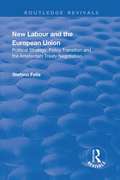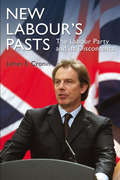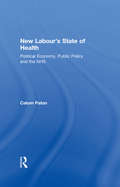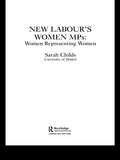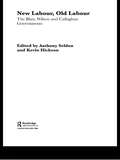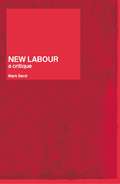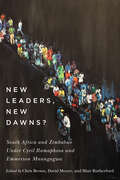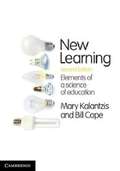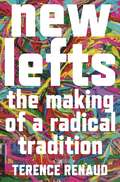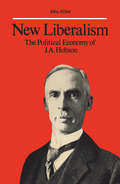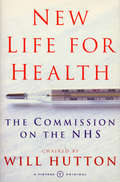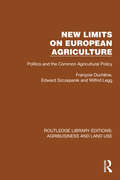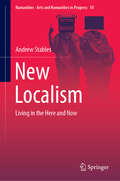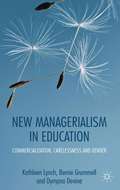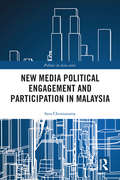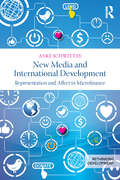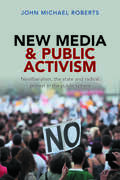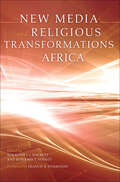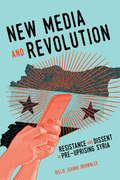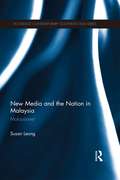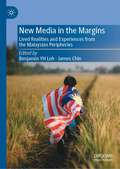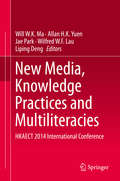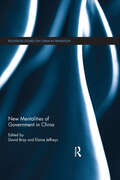- Table View
- List View
New Labour and the European Union: Political Strategy, Policy Transition and the Amsterdam Treaty Negotiation (Routledge Revivals)
by Stefano FellaThis title was first published in 2002. This book makes a valuable contribution to the literature on the UK-EU relationship and on the development of the Labour party since Tony Blair became leader in 1994, providing a detailed examination of the process of policy-making undertaken by Labour in relation to the 1996-97 intergovernmental conference (IGC) of the EU. It tracks policy development from opposition to government, culminating in the conclusion of treaty negotiations at Amsterdam in June 1997. The book moves beyond the existing literature in providing an original account of policy-making based on internal party and government sources. It highlights a ’New Labour’ approach to the EU - set in place by the time of the Amsterdam summit and characteristic of the Blair government’s European policy thereafter - and suggests that this approach represents both continuity and change with previous UK governments and a break from the European social democratic perspective that had been central to Labour’s previous pro-European conversion.
New Labour's Pasts: The Labour Party and Its Discontents
by James E. CroninWhere other books are either highly partisan dismissals or appreciations of the Third Way, or dull sociological accounts, this book gets behind the clichés in order to show just what is left of Labour party ideology and what the future may hold.New Labour has changed the face of Britain. Culture, class, education, health, the arts, leisure, the economy have all seen seismic shifts since the 1997 election that raised Blair to power. The Labour that rules has distanced itself from the failed Labour of the 70s and 80s, but the core remains. Labour remains gripped by its own past - unable and unwilling to shed its ties to the old Labour party, but determined to avoid the mistakes of which lead to four electoral defeats between 1979 and 1992. Cronin covers the full history of the party from its post war triumph through decades of shambolic leadership against ruthless and organised opposition to the resurgent New Labour of the 90s that finally took Britain into the new millennium.
New Labour's State of Health: Political Economy, Public Policy and the NHS
by Calum PatonIn this timely and unique work, Calum Paton assesses the political economy and politics of current health policy in order to explain the underlying causes of problems in the National Health Service. Debates from political theory, political economy and public administration are used to examine health policy made and implemented by New Labour since their election victory in 1997. The author argues that the fundamental nature of health policy is dependent upon the prevailing regime in political economy and also that 'policy overload', contradictions and confusion have rendered the task of coherent implementation very difficult. Although there is implicit comparison, the primary focus is England within the UK (post-devolution), and the book provides a detailed examination of contemporary health policy. Written by an established scholar in the field, it will particularly interest academics, post-graduate students and professionals in health policy, social policy and politics.
New Labour's Women MPs: Women Representing Women
by Sarah ChildsIt was not long after the election of a record number of women to the House of Commons in 1997 that the backlash began. The criticism was all-encompassing: they wore the wrong clothes, they voted the wrong way and they were concerned with the wrong issues. Above all, they were accused of failing to make difference, to have failed women, and were dismissed by some as ‘Blair’s Babes’. Drawing on in-depth interviews with more than half of the new Labour women MPs, Sarah Childs reveals how these women actually experienced being MPs, and explores whether they acted for and like women – in their constituencies, in parliament and in government. She presents important insights into theories of women’s political representation, showing that the relationship between women’s descriptive and substantive representation is complicated, that party and gender identities are crucial, that women’s differences must be acknowledged and that it might not always be possible for women representatives to act for women even if they want to. Including a key section on women’s selection for parliament; whether women MPs act as role models; why it is important that women should be present in politics; as well as exploring in depth the subject of women’s substantive representation, New Labour’s Women MPs is essential reading for all those interested in women and politics, legislative studies, political behaviour and representation.
New Labour, Old Labour: The Wilson and Callaghan Governments 1974-1979
by Anthony Seldon Kevin HicksonWe are constantly told that New Labour forms an historic departure from the traditions of the Labour Party. This book, written by a distinguished selection of academics and commentators, provides the most detailed comparison yet of old and new Labour in power. It is also the first to offer a comprehensive analysis of the last Labour Government before the rise of Thatcher and the re-emergence of the Labour Party under Tony Blair's leadership. It reveals much about the history of the Labour Party as well as providing a much-needed context from which to judge the current government.
New Labour: A Critique
by Mark BevirNew Labour is the most innovative and powerful political movement in Britain today. However, New Labour: A Critique argues that its apparent pragmatism disguises an ideological commitment to particular forms of social science, deploying new institutionalism and communitarianism to respond to the New Right.Bevir traces the impact of these forms of social science on the ideas and policies of New Labour, paying particular attention to the welfare state and the economy. New Labour, the new institutionalism and communitarianism typically objectify aspects of the social world to sustain claims to expert knowledge. Bevir defends and enacts an alternative, interpretive approach to social science. This interpretive approach inspires a critique of New Labour as a contingent reworking of a particular socialist tradition rather than the necessary or pragmatic response that it portrays itself as.
New Leaders, New Dawns?: South Africa and Zimbabwe under Cyril Ramaphosa and Emmerson Mnangagwa
by Chris Brown, David Moore, and Blair RutherfordIn late 2017 and early 2018, South Africa and Zimbabwe both experienced rapid and unexpected political transitions. In Zimbabwe, Robert Mugabe, the only leader the country had ever known, was replaced in a “soft coup” by his erstwhile vice-president, Emmerson Mnangagwa. Over a twelve-day period in February 2018, South African president Jacob Zuma was prematurely forced from office by his former deputy president, Cyril Ramaphosa. The widespread popular rejoicing that accompanied their arrival compounded the shock of these sudden transitions.New Leaders, New Dawns? explores these political transitions and the way they were received. Contributors consider how the former liberation heroes Mugabe and Zuma could have fallen so low; the underlying reasons for their ouster; what happened to their liberation movements turned ruling parties; and, perhaps most importantly, what the rise to power of Ramaphosa and Mnangagwa foreshadowed. Bringing together fourteen leading international scholars of southern Africa, and adopting a political economy framework, this volume argues that the changes in leadership are welcome, but insufficient. While the time had come for Zuma and Mugabe to go, there is little in the personal histories or early policy actions of Ramaphosa and Mnangagwa that suggests they will be capable of addressing the profound social, economic, and political problems both countries face.New Leaders, New Dawns? reveals that despite what these new leaders may have promised, a “new dawn” has not yet arrived in southern Africa.
New Leadership of Civil Society Organisations: Community Development and Engagement (Routledge Explorations in Development Studies)
by Ibrahim NatilThis book investigates the political, social, and economic dynamics and structures that influence the leadership of Civil Society Organisations at the local, national, and global levels. Civil Society Organisations (CSOs) play an increasingly important role in the political, economic, and social dynamics that shape daily lives across the world. Encompassing a diverse range of organisations, objectives, and activities, the CSO sector is an expansive terrain characterised by dynamic relationships between leaders, agents of action, the communities, and the global challenges that drive their agenda, which span from poverty to climate emergency to injustice to inequalities. Drawing on case studies from Brazil, India, Yemen, Syria, Iran, and Turkey, this book explores the distinct challenges faced by CSO leaders, their current operational practices, and their strategies for future development. The book highlights the roles, contributions, and challenges of young CSO leaders in particular, at a time when they are taking an increasingly active role as agents for change and development. Overall, the book emphasises the ways in which CSO leaders are not only shaped by profound challenges such as Covid-19, but also proactively react and respond. It will be of interest to researchers across the fields of global development, business studies, peacebuilding, international relations, and civil society.
New Learning
by Bill Cope Mary KalantzisIn the second edition of New Learning: Elements of a Science of Education, renowned authors Mary Kalantzis and Bill Cope explore the contemporary debates and challenges in education. In this time of dramatic social change, education represents significant possibilities and opportunities. Written in accessible and lively style, this book examines learners and their learning environments and considers how schools can prepare their students for the future. Featuring new classroom examples, case studies and excellent online resources at newlearningonline. com, this book strikes a balance between theoretical understandings and their practical applications. Fully revised and updated, the second edition and its companion website include greater coverage of educational psychology and cognitive science perspectives, the use of assessment in education and curriculum developments around the world. New Learning Second Edition is an inspiring and comprehensive resource for pre-service and in-service teachers alike.
New Lefts: The Making of a Radical Tradition
by Terence RenaudA groundbreaking history of Europe's "new lefts," from the antifascist 1920s to the anti-establishment 1960sIn the 1960s, the radical youth of Western Europe's New Left rebelled against the democratic welfare state and their parents' antiquated politics of reform. It was not the first time an upstart leftist movement was built on the ruins of the old. This book traces the history of neoleftism from its antifascist roots in the first half of the twentieth century, to its postwar reconstruction in the 1950s, to its explosive reinvention by the 1960s counterculture.Terence Renaud demonstrates why the left in Europe underwent a series of internal revolts against the organizational forms of established parties and unions. He describes how small groups of militant youth such as New Beginning in Germany tried to sustain grassroots movements without reproducing the bureaucratic, hierarchical, and supposedly obsolete structures of Social Democracy and Communism. Neoleftist militants experimented with alternative modes of organization such as councils, assemblies, and action committees. However, Renaud reveals that these same militants, decades later, often came to defend the very institutions they had opposed in their youth.Providing vital historical perspective on the challenges confronting leftists today, this book tells the story of generations of antifascists, left socialists, and anti-authoritarians who tried to build radical democratic alternatives to capitalism and kindle hope in reactionary times.
New Liberalism
by John AllettJohn A. Hobson was a prominent member of a small band of British radicals who argued around the turn of the century that the consistent application of liberal ideas required the reorganization of capitalist societies along socialist lines. Allett here suggests that their march toward socialism was marked by a caution not overly to damage the liberal heritage of their forefathers and yet to provide a philosophical foundation for the creation of the welfare state, justified on the basis of right and efficiency. The author emphasizes Hobson's doctrine of imperialism and the related theory of under-consumption for which he is best known, while arguing that the lesser known of Hobson's doctrines--which the author describes as the 'organic theory of surplus value'--is essential to a full appreciation of the coherence of Hobson's thought. Allett compares the analyses of Hobson, Adam Smith, J.S. Smith, the Webbs, T.H. Green, Bosanquet, Marx, Lenin, Keynes, and Hobson's comrade-in-arms L.T. Hobhouse and puts in perspective the dismissive critiques of those contemporary scholars who claimed that Hobson's work is value-laden, simplistic, and contradictory. This study presents an integral analysis of the life, times, and thought of a profound and original thinker, whose legacy to social democratic thought has yet to be fully appreciated.
New Life For Health: The Commission on the NHS chaired by Will Hutton
by Will HuttonThe National Health Service is Britain's greatest and most prized national institution. Ever since it's foundation the NHS has commanded extraordinary popular affection and loyalty. Its medical and non-medical staff force alike has been strongly committed to its success and values. However, now more than fifty years later, a huge gap has developed between what the NHS is able to deliver and the expectations and the needs of its users. The deterioration of the NHS dominates our news headlines today. In 1999 the Association of Community Health Councils for England and Wales established a Commission, chaired by Will Hutton, to examine the issue of the public interest and accountability of the NHS. The Commission's report has come up with some radical reforms that will transform the accountability of the NHS and will help rebuild the relationships between patients, doctors and NHS staff on a new basis of openness and trust.
New Life in Public Squares
by Marie BurnsNew Life in Public Squares investigates the evolution of the public square within the urban form and its meaning to a city’s image. It explores what is driving investment in the creation of new or re-designed existing squares: the economic and social benefits, city image to attract tourism, investment and attracting major events. Taking a design practitioners perspective, a series of in-depth case studies, including discussions with clients and designers, on an international array of public squares will analyse and the use of public spaces and the impact they have on their immediate surroundings. It shows readers how quality design of public squares can be achieved and, importantly, how they can be delivered to enable positive changes in the way public spaces are used and experienced.
New Limits on European Agriculture: Politics and the Common Agricultural Policy (Routledge Library Editions: Agribusiness and Land Use #7)
by François Duchêne Edward Szczepanik Wilfrid LeggUntil about 1970, Western Europe was regarded as the great food-importing region of the world. Over the next 15 years it also became a major food exporter. This study, originally published in 1985, analyses the expansionary policies of individual nations, as well as those of the Community itself, which have helped produce this momentous reversal of Western Europe’s traditional role. The phenomenon in the international food market is reviewed within the context of the economic and political forces responsible for changes in Western European agriculture during the late 20th Century.
New Localism: Living in the Here and Now (Numanities - Arts and Humanities in Progress #10)
by Andrew StablesThis book examines “New Localism' – exploring how communities have turned towards more local concerns: my street, my town, my state, as an expression of dissatisfaction with globalization. It details the ideas that have created a political force that academics have often misunderstood and provides a template for further investigation with a strong focus on how to harness the motivations behind such changes for the benefit of individuals, communities and the more-than-human environment.The book discusses human progress, both individual and collective, in terms of the interactions of the local and the global, the specific and the universal, and the concrete and the abstract. It also considers how forms of social progress can be understood and reconfigured in the context of the rejection of certain aspects of liberal intelligentsia orthodoxy over recent years.Developing his arguments with specific reference to the evolving, political landscape, the author helps readers to understand major events such as the Trump presidency and the British vote to leave the EU from a fully semiotic perspective. He also explains how educational processes can use and respond to such events in ways that are locally grounded but nevertheless not at odds with more abstract formulations of progress such as sustainability and social justice.
New Managerialism in Education
by Kathleen Lynch Bernie Grummell Dympna DevineThis book examines the impact of neo-liberal reform on the traditional caring ethos of public services such as education, exploring how these reforms influence the appointment and experiences of senior management across the education sector.
New Media Political Engagement And Participation in Malaysia (Politics in Asia)
by Sara ChinnasamyThis book analyses the exponential growth of independent news portal (INPs) in Malaysia and discusses the extent of impacts generated from these portals in Malaysian electoral conduct especially during Malaysia's 12th and 13th general elections. The mainstream media in Malaysia has for decades been controlled by strict laws such as the Printing Presses and Publications Act (PPPA) and the Sedition Act, as well as self-censorship by print and broadcast journalists and editors. The rise of INP in Malaysia has challenged this government stranglehold, as well as making information available much faster than the mainstream media. The undeniable speed of the news posted on INP which often come with interactive contents are seen to have caused a remarkable increment on public’s options with regards to expressing their political views. Some of the INPs have also impressively taken up a notch by providing live streaming videos or interesting online visual news which indirectly unifies various sectors of pressure groups in providing options of circulating and disseminating information to the public. The interviews conducted for this book provide deeper insights from those producing news and at the same time provide a specific and thorough observation on political events including representatives of the Malaysian middle class, Opposition parties, youth and university students, NGOs and civil society movements. Chinnasamy investigates key questions relating to this shift in relation to media preference concerning on the mainstream and political landscape in Malaysia. Did the INP evolve new democratic movement in the country or induce a change in the way the government retains its power by increasing people's active engagement in political participation? Did any revolution in government-managed media landscape occur drastically? If so, how did they accomplish these changes? This book will fill the gap of existing research on how far have the INP empowered themselves to be the third force in fighting democratic movement in the country and how the ruling government continues seeing it as a contention, as foreseen by many experts in the industry.
New Media and International Development: Representation and affect in microfinance (Rethinking Development)
by Anke SchwittayNew Media and International Development is the first in-depth examination of microfinance’s enduring popularity with Northern publics. Through a case study of Kiva.org, the world’s first person-to-person microlending website, and other microfinance organizations, the book argues that international development efforts have an affective dimension. This is fostered through narrative and visual representations, through the performance of development rituals and through bonds of fellowship between Northern donors and Southern recipients. These practices constitute people in the global North as everyday humanitarians and mobilize their affective investments, which are financial, social and emotional investments in distant others to alleviate their poverty. This book draws on ethnographic material from the US, India and Indonesia and the anthropological and development studies literature on humanitarianism, affect and the public faces of development. It opens up novel avenues of research into the formation of new development subjects in the global North. This book will appeal to researchers and students of international development, anthropology, media studies and related fields, as well as practitioners and professionals in the field of international development
New Media and Public Activism: Neoliberalism, the State and Radical Protest in the Public Sphere
by John Michael RobertsThe Arab Spring, chat forums, political leaders tweeting, online petitions, and protestors in the Occupy Movement - new media public spheres have without doubt radically altered social and political activism in society. But to what extent is this new activist public sphere stifled by the neoliberal economy and workfare state? Have we in fact become transformed into subjects of online consumption and orderly surveillance, rather than committed social and political campaigners? In this highly topical book, John Michael Roberts employs a political economy perspective to explore the relationship between financial neoliberal capitalism and digital publics. He assesses the extent to which they provide new forms of radical protest in civil society and offers an indispensable guide to understanding the relationship between the state, new media activism and neoliberal practices.
New Media and Religious Transformations in Africa
by Rosalind I. J. Hackett and Benjamin F. SoaresNew Media and Religious Transformations in Africa casts a critical look at Africa's rapidly evolving religious media scene. Following political liberalization, media deregulation, and the proliferation of new media technologies, many African religious leaders and activists have appropriated such media to strengthen and expand their communities and gain public recognition. Media have also been used to marginalize and restrict the activities of other groups, which has sometimes led to tension, conflict, and even violence. Showing how media are rarely neutral vehicles of expression, the contributors to this multidisciplinary volume analyze the mutual imbrications of media and religion during times of rapid technological and social change in various places throughout Africa.
New Media and Revolution: Resistance and Dissent in Pre-uprising Syria (McGill-Queen's Studies in Protest, Power, and Resistance #1)
by Billie Jeanne BrownleeThe Arab Spring did not arise out of nowhere. It was the physical manifestation of more than a decade of new media diffusion, use, and experimentation that empowered ordinary people during their everyday lives. In this book, Billie Jeanne Brownlee offers a refreshing insight into the way new media can facilitate a culture of resistance and dissent in authoritarian states. Investigating the root causes of the Syrian uprising of 2011, New Media and Revolution shows how acts of online resistance prepared the ground for better-organised street mobilisation. The book interprets the uprising not as the start of Syria's social mobilisation but as a shift from online to offline contestation, and from localised and hidden practices of digital dissent to tangible mass street protests. Brownlee goes beyond the common dichotomy that frames new media as either a deus ex machina or a means of expression to demonstrate that, in Syria, media was a nontraditional institution that enabled resistance to digitally manifest and gestate below, within, and parallel to formal institutions of power. To refute the idea that the population of Syria was largely apathetic and apolitical prior to the uprising, Brownlee explains that social media and technology created camouflaged geographies and spaces where individuals could protest without being detected. Challenging the myth of authoritarian stability, New Media and Revolution uncovers the dynamics of grassroots resistance blossoming under the radar of ordinary politics.
New Media and the Nation in Malaysia: Malaysianet (Routledge Contemporary Southeast Asia Series)
by Susan LeongIn the four decades or so since its invention, the internet has become pivotal to how many societies function, influencing how individual citizens interact with and respond to their governments. Within Southeast Asia, while most governments subscribe to the belief that new media technological advancement improves their nation’s socio-economic conditions, they also worry about its cultural and political effects. This book examines how this set of dynamics operates through its study of new media in contemporary Malaysian society. Using the social imaginary framework and adopting a socio-historical approach, the book explains the varied understandings of new media as a continuing process wherein individuals and their societies operate in tandem to create, negotiate and enact the meaning ascribed to concepts and ideas. In doing so, it also highlights the importance of non-users to national technological policies. Through its examination of the ideation and development of Malaysia’s Multimedia Super Corridor mega project to-date and reference to the seminal socio-political events of 2007-2012 including the 2008 General Elections, Bersih and Hindraf rallies, this book provides a clear explanation for new media’s prominence in the multi-ethnic and majority Islamic society of Malaysia today. It is of interest to academics working in the field of Media and Internet Studies and Southeast Asian Politics.
New Media in the Margins: Lived Realities and Experiences from the Malaysian Peripheries
by James Chin Benjamin Yh LohThis book consists of nine chapters, each an in-depth case study into a specific non-mainstream or marginalized online community in Malaysia. The authors come from diverse backgrounds to talk about how new media can both assist and hinder maligned minorities, ignored ethnicities or the often attacked migrants in their day to day lives. The book makes a strong contribution to Malaysian studies which highlights the other and represents minority viewpoints to challenge the belief that Malaysia’s online space is monolithic and limited to several mainstream discourses in Malaysian scholarship.
New Media, Knowledge Practices and Multiliteracies
by Jae Park Will W.K. Ma Allan H.K. Yuen Wilfred W.F. Lau Liping DengThis volume highlights key aspects of new media, knowledge practices and multiliteracies in communication and education, providing readers with a range of empirical findings, novel theories and applications. The reports also include best practices, case studies, innovative solutions and lessons learned with regard to three core fields: (1) New media: discussions on the effects of traditional and new media, legal risks concerning social media, the effects of media intervention on help-seeking attitudes, obstacles of using tablets for learning, qualitative interpretation of media reporting, use of social media for enhancing design practices, and news-reading habits; (2) Knowledge practices: exploration of online viewing and lifestyles, reform of school management models, undergraduate students' mathematics learning experiences, perceived accounting ethics and online knowledge sharing, creating knowledge repositories, digital technologies outside school, smartphone usage and life satisfaction, and cultural differences and isomerism; and (3) Multiliteracies: studies on learning style inventories, the impact of ICT in interdisciplinary approaches, ePortfolios for learning, video production and generic skills enhancement, mobile-assisted collaborative learning, and the effects of project-based learning on student achievements. The reports presented are from various countries and organizations.
New Mentalities of Government in China: Emerging Professions, Vocations And Citizens (Routledge Studies on China in Transition)
by David Bray Elaine JeffreysChina continues to transform apace, flowing from the forces of deregulation, privatization and globalization unleashed by economic reforms which began in late 1978. The dramatic scope of economic change in China is often counterposed to the apparent lack of political change as demonstrated by continued Chinese Communist Party (CCP) rule. However, the ongoing dominance of the CCP belies the fact that much has also changed in relation to practices of government, including how authorities and citizens interact in the management of daily life. New Mentalities of Government in China examines how the privatization and professionalization of ‘public’ service provision is transforming the nature of government and everyday life in the People’s Republic of China (PRC). The book addresses key theoretical questions on the nature of government in China and documents the emergence of a range of ‘new mentalities of government’ in China. Its chapters focus on areas such as clinical trials, conceptualizing government, consumer activity, elite philanthropy, lifestyle and beauty advice, public health, social work, volunteering; and urban and rural planning. Offering a topical examination of shifting modes of governance in contemporary China, this book will appeal to scholars in the fields of anthropology, history, politics and sociology.
